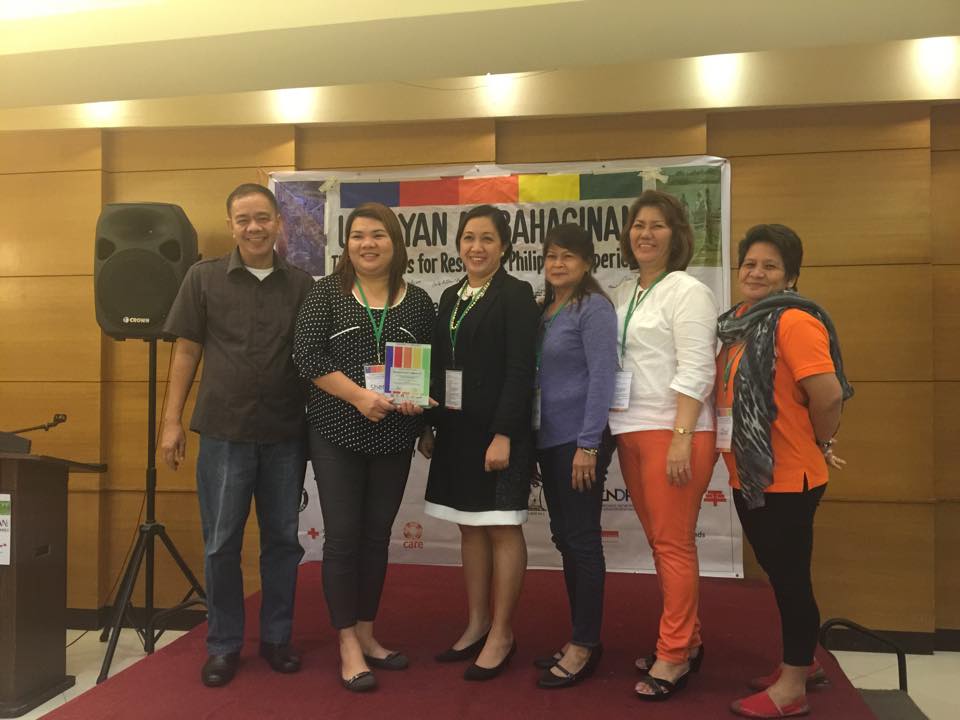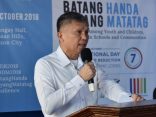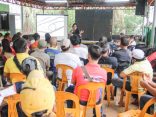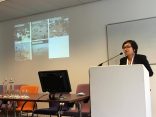 Around 200 representatives from barangays, municipalities, national government agencies, and NGOs called for adopting a climate-smart and ecosystem-based approach to disaster risk reduction (DRR) in Manila. It was the culmination to the second annual “Ugnayan at Bahaginan: The Partners for Resilience Philippine Experience” national conference.
Around 200 representatives from barangays, municipalities, national government agencies, and NGOs called for adopting a climate-smart and ecosystem-based approach to disaster risk reduction (DRR) in Manila. It was the culmination to the second annual “Ugnayan at Bahaginan: The Partners for Resilience Philippine Experience” national conference.
In photo: Barangay Potrero in Malabon, led by its captain Sheryl Nolasco (second from the left), being recognized at the end of the conference for their efforts in building a more resilient community. (from Barangay Potrero Facebook account)
Around 200 representatives from barangays, municipalities, national government agencies, and NGOs called for adopting a climate-smart and ecosystem-based approach to disaster risk reduction (DRR) in Manila. It was the culmination to the second annual “Ugnayan at Bahaginan: The Partners for Resilience Philippine Experience” national conference.
Over the years, the increasing magnitude and frequency of disasters due to the effects of climate change and environmental degradation continue to set back hard-earned development gains. By adapting to the effects of climate change and managing our natural resources well, we lower the risk of disasters more effectively and sustainably.
Ugnayan at Bahaginan was held July 22 at the City Garden Suites Manila. It was organized by Assistance and Cooperation for Community Resilience and Development (ACCORD) and the Philippine Red Cross through the Partners for Resilience (PfR) Project, in cooperation with CARE Nederland and the Netherlands Red Cross. Supported by the Netherlands Ministry of Foreign Affairs, PfR is concluding this year.
Present were officials from communities in Metro Manila, CARAGA, and the Cordilleras that are most vulnerable to natural hazards. Also at hand were representatives from the NDRRMC, PAGASA, DRRNet, and ECHO.Before the conference, participants visited project sites in Malabon and Valenzuela. They checked facilities related to DRR such as early warning systems, waste management and bio-intensive gardening in schools. Interacting with barangay members, they also gained a firmer understanding at the processes and results of the five-year project in an urban setting.
Gwendolyn Pang, Secretary General of the Philippine Red Cross, welcomed participants to the conference, saying, “A lot of hard work has went into the Partners for Resilience work. We must all continue to learn from each other’s experiences.”
Delivering a message on behalf of Her Excellency Ambassador Marion Derckx of the Netherlands, Senior Commercial Officer Eileen Vizmonte noted that PfR “has lived up to the idea of partnerships” towards “a Philippines that can stand up better against disasters.” The keynote speaker, Director Susana Cruz of the Office of Civil Defense-National Capital Region, agreed, saying that “We will continue to work with CSOs for resilience.”
The individual sessions at the conference discussed various elements in building the resilience of communities against disasters. These included integrating DRR into development planning, strengthening and diversifying livelihoods, and developing partnerships. Also showcased during the conference were three of PfR’s proudest products and partners Barangay Kayan West in Mt. Province, Barangay Quezon from Surigao del Norte, and Barangay Potrero in Malabon City.
At the end of the conference, participates reiterated their commitment to a more resilient country by signing a unity statement. They called on the national government and other stakeholders to adopt a climate-smart and ecosystem-based approach to DRR. They also recognized the need to work together even more to achieve their goals.
Gen de Jesus, PfR Country Coordinator, expressed her gratitude to participants for the success of the event. “We have been partners for five years, and we are amazed how far many of you have come towards a safer future. With our joint accomplishments, we have built a strong case for advocating resilience at the national and international levels in the coming years.”
For her part, ACCORD executive director Marieta Alcid highlighted the need for more capacity building. “We need to ensure that LGUs can do what is expected of them. Still, we have much to be proud of. Our partner communities have shown that despite the challenges, a legacy of resilience is possible.”




